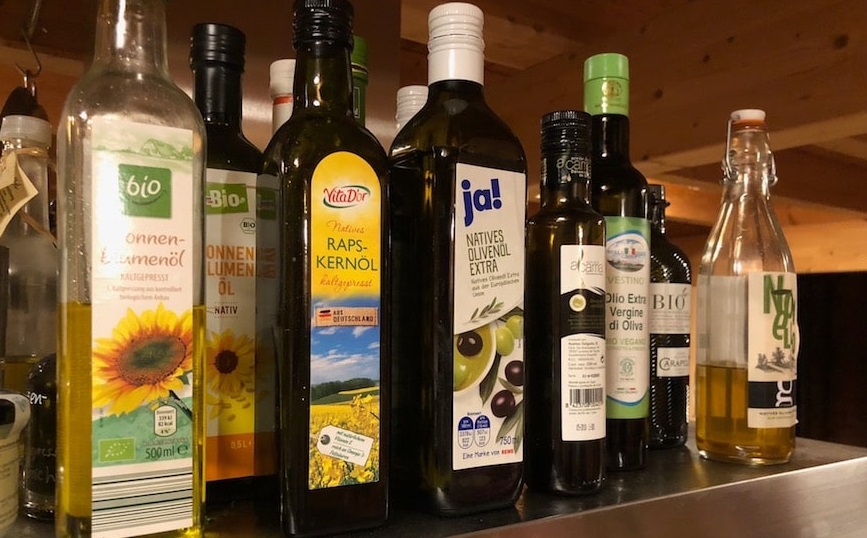Which oil should you use when using a contact grill?

Not every oil is suitable for grilling. Some oils burn at high heat, while others can withstand extreme grill temperatures. Before randomly buying a bunch of oils, it’s important to consider various options. I’ve compiled a list of the most important factors to consider when choosing the right oil for grilling on contact grills so that you know which oil is suitable for the contact grill.
Why You Should Use the Right Oil for Grilling
The contact grill allows for low-fat grilling thanks to its non-stick coating and grease collection tray. The non-stick coating ensures that no food sticks to the grill surfaces, even if you haven’t used oil. The grease collection tray, on the other hand, gathers all the excess fat and oil from the grilled food. Most contact and electric grills typically come with both a non-stick coating and a grease collection tray built-in. However, if your device doesn’t have a non-stick coating, you’ll need to apply a small amount of oil to the grill surface. Apart from imparting a different flavor to your grilled food, the oil protects it from heat and also makes it easier to flip your ingredients.
You might be considering using your usual kitchen oil for grilling with your contact grill. However, I strongly advise against this. The grill plate of an electric grill is much hotter than your regular stovetop. Conventional oils oxidize faster, altering their chemical composition and diminishing their taste and effectiveness. Hence, it’s important to choose the right type of oil for grilling. You need an oil that can withstand high heat without burning. With the right oil, you’ll notice a significant difference in your grilling results.
What factors should you consider when choosing oil for your contact grill?
Oils come from different sources and are produced using various methods. This makes a big difference in how they perform on the grill plate, grill rack, or on your stove or oven. Therefore, it’s important to know what makes an oil suitable for grilling. Here’s a list of important considerations when selecting oil for your contact grill:
Smoke Point
The smoke point is the temperature at which the fat or oil begins to produce smoke. The smoke point is evidence of the heat-induced breakdown of the fat. This can result in a very unpleasant smell and taste. To avoid this burnt taste (and smell in your kitchen), every oil should be able to handle the required heat for its application. For example, grilling requires an oil that can reach 220°C before it starts to smoke (higher is even better).
The smoke point for edible oils varies significantly. It depends on the components, origin, and degree of refinement of the respective oil. The smoke point tends to rise with decreasing content of free fatty acids and increasing degree of refinement. Additionally, heated oil produces more free fatty acids, which in turn lowers the smoke point. For this reason, experts advise against using the same oil more than twice.
Taste
Many oils also impart their own distinctive flavors. For instance, peanut oil and avocado oil give the grilled food strong and unique flavors. Depending on what you’re cooking, this can significantly elevate the taste of your grilled food. However, if you don’t want to add flavors, you should use neutral oils like vegetable oil, sunflower oil, and grape seed oil.
Nutritional Value
If you’re aiming for healthy grilling results, the type of oil plays a crucial role. Consider oils that are low in saturated and trans fats, which are beneficial for your heart. Avocado and olive oils are nutrient-rich and packed with vitamins.
Price
This is another important aspect. Higher-quality oils like extra virgin olive oil or avocado oil cost more. These oils are more labor-intensive to produce and have a unique source, which naturally raises the price. If you don’t want to spend much on your grilling oil, there are cheaper oils with high smoke points available in the market.
Common Types of Oil for the Contact Grill
Here are the most common types of oil that you can use for your contact grill:
Olive Oil
Olive oil is one of the healthiest oils you can use for cooking, as it contains no carbohydrates or proteins. All its calories come from fat, mostly unsaturated, making it an extremely healthy addition to your diet. Extra virgin olive oil has a smoke point around 180-215°C, while virgin olive oil smokes at about 199°C. Above their smoke points, the unrefined particles in the oil get burnt, resulting in an unpleasant taste of the grilled food. Although there are olive oils that can withstand high temperatures for grilling, most olive oils are used for salad dressings and cooking at moderate temperatures.
Grape Seed Oil
Grape seed oil is made from the seeds discarded during winemaking. It has a relatively high smoke point of about 215°C. This, along with its “clean” taste, makes grape seed oil ideal for use as an all-purpose cooking oil. While there are better oils for grilling, grape seed oil is still an excellent choice for frying as well as for salad dressings.
Vegetable Oil
Oil simply labeled as “vegetable oil” is usually a blend of different types of neutral-tasting oils. It can be used in baking or daily cooking and is more affordable than other oils. However, it’s not always possible to know exactly what’s in the oil or how it’s processed. For example, it could be a combination of sunflower oil with other neutral plant-based oils like corn or safflower oil. Most vegetable oils have a high smoke point (around 220°C) and can withstand the high temperatures of an electric grill’s heating plate.
Peanut Oil
Peanut oil is a golden-colored oil commonly used in Asian and Middle Eastern cuisine. It has an exceptionally high smoke point (232°C), making it excellent for grilling, frying, and deep frying. Peanut oil is also very healthy to use. It contains no trans fats (the bad type of fat) and is packed with unsaturated fats (the healthy type). Additionally, peanut oil has a high content of vitamin E and antioxidants. However, peanut oils tend to deteriorate faster than other oils. To avoid this, I recommend buying peanut oil in a small bottle and storing it in a cool place.
Sunflower Oil
Sunflower oil is a lightly odorless and nearly tasteless oil pressed from sunflower seeds. With its high smoke point of 232°C, sunflower oil can be used for various purposes in the kitchen and on the grill. Thanks to its slightly mild taste, it’s great for sauces and marinades. Sunflower oil can also be used for sautéing, baking, and grilling.
Avocado Oil: The Best Oil for Grilling
Avocado oil is one of the healthiest oils on the market. The flesh of the avocado contains about 20 minerals and vitamins. Additionally, an avocado contains more potassium than a banana, more protein than any other fruit, half of the recommended daily dose of vitamin K, and one-third of the vitamin C. Besides its health benefits, avocado oil has a very high smoke point of over 270 degrees Celsius. It withstands the temperatures of an electric grill’s heating plate as well as the grill grate and plate of a charcoal and gas grill. And lastly, avocado oil tastes good and adds an amazing flavor to any grilled food it’s added to. The only downside is that it tends to be more expensive.
How Do You Oil Your Contact Grill?
For electric grills that have a non-stick coating, you don’t need to oil your grill plate. If you plan to grill for many people, you’ll also need to oil your interchangeable plate. However, if you don’t have this feature, you’ll need some oil to prevent the grilled food from sticking or burning on the grill plate. In this case, you can use a kitchen towel with oil to oil the interchangeable plate. However, don’t add too much. You only need enough oil to make the plates shine. If you’re unsure whether your contact grill has a non-stick coating, you should check the user manual or contact the manufacturer.
Conclusion
Oil has a major impact on your grilling results. It not only protects the grilled food from burning but also influences the taste of your dishes. To select the right oil for your contact grill, you need to consider some factors: smoke point, taste, nutrition, and price. Pay special attention to the smoke point. That’s the temperature at which the oil begins to smoke. The heating plate of the contact grill operates at a temperature of at least 220°C. Therefore, it’s important to choose an oil whose smoke point is higher than this temperature. For this reason, I recommend using vegetable oils, peanut oil, sunflower oil, and avocado oil for your contact grill. On the other hand, I recommend olive oil and grape seed oil for salads, baking, and cooking at moderate heat. If you’re still looking for a grill, you should check out my contact grill comparison. In another post, we’ll explore whether oil or fat is even necessary for a contact grill.
